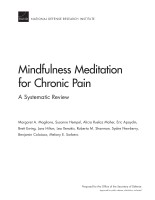| 来源类型 | Research Reports
|
| 规范类型 | 报告
|
| DOI | https://doi.org/10.7249/RR1317
|
| 来源ID | RR-1317-OSD
|
| Mindfulness Meditation for Chronic Pain: A Systematic Review |
| Margaret A. Maglione; Susanne Hempel; Alicia Ruelaz Maher; Eric Apaydin; Brett Ewing; Lara Hilton; Lea Xenakis; Roberta M. Shanman; Sydne Newberry; Benjamin Colaiaco; et al.
|
| 发表日期 | 2016
|
| 出版年 | 2016
|
| 页码 | 112
|
| 语种 | 英语
|
| 结论 |
Mindfulness Meditation Is Associated with a Small Effect of Improved Pain Symptoms, but the Quality of Evidence is Low- Of 28 included randomized controlled trials on the efficacy of mindfulness meditation for chronic pain, 24 reported continuous pain measures. Results of pooled analysis indicated a statistically significant reduction of pain symptoms, but the quality of evidence that mindfulness meditation is associated with a decrease in chronic pain compared with control is low overall.
- In subgroup analyses of comparators, mindfulness meditation significantly reduced pain scale scores compared with treatment as usual, but not compared with passive controls, such as waitlists, or with education or support groups.
- There is high quality evidence that mindfulness meditation to treat chronic pain significantly reduced depressive symptoms, and there is moderate quality evidence that it improves physical and mental health-related quality of life.
- The efficacy of mindfulness meditation did not differ significantly when given as monotherapy or adjunctive therapy or by type of intervention, medical condition, or frequency or duration of treatment.
|
| 摘要 |
- More well-designed, rigorous, and large trials are needed in order to develop an evidence base that can more decisively provide estimates of the efficacy of mindfulness meditation for chronic pain.
- Given published case reports of adverse events during meditation, including psychosis, future trials should actively collect adverse event data. In addition, a systematic review of observational studies and case reports would shed additional light on adverse events during mindfulness meditation.
- Further research examining the effect of mindfulness meditation on chronic pain should also focus on better understanding whether there is a minimum frequency or duration of meditation practice for it to be effective. Future trials should monitor adherence (meditation practice) both during the intervention program and after the program ends if long-term results are to be assessed.
|
| 主题 | Complementary and Alternative Medicine
; Health Interventions
; Health-Related Quality of Life
; Musculoskeletal Disorders
; Pain Management
|
| URL | https://www.rand.org/pubs/research_reports/RR1317.html
|
| 来源智库 | RAND Corporation (United States)
|
| 引用统计 |
|
| 资源类型 | 智库出版物
|
| 条目标识符 | http://119.78.100.153/handle/2XGU8XDN/108328
|
推荐引用方式
GB/T 7714 |
Margaret A. Maglione,Susanne Hempel,Alicia Ruelaz Maher,et al. Mindfulness Meditation for Chronic Pain: A Systematic Review. 2016.
|
|
文件名:
|
x1495316309104.jpg
|
|
格式:
|
JPEG
|

|
文件名:
|
RAND_RR1317.pdf
|
|
格式:
|
Adobe PDF
|
除非特别说明,本系统中所有内容都受版权保护,并保留所有权利。